Smile (2022)
Directed by: Parker Finn
Written by: Parker Finn
Starring: Jessie T. Usher, Kyle Gallner, Sosie Bacon
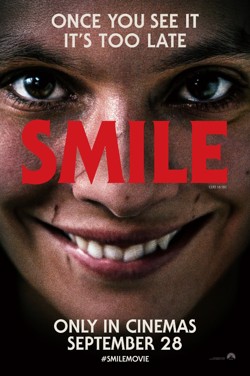
SMILE
Directed by Parker Finn
A non-franchise 18-certificate horror getting a cinema release? There’s something to be happy about. Smile is the feature debut of writer/director Parker Finn, who has extended upon his short Laura Hasn’t Slept. In this, a therapist with a dark past, Rose (Bacon), has a patient die on her in horrific circumstances. Afterward, she is haunted by terrible visions thrust upon her by a malevolent force. Taking the form of a stranger, or sometimes a close contact, it stalks her, plays evil tricks on her, and gaslights her – all the time, doing this wide, frightening ear-to-ear grin. As her job, her relationships, and even her pet are threatened, she begins to unravel. The only person who doesn’t doubt her is Joel (Gallner), a detective and convenient plot device who may or may not have feelings for her.
Smile isn’t an especially original concept. Indeed, it has echoes of several better movies: The Invisible Man, It Follows, and The Ring. It also shares aspects of the forgetable Blumhouse Truth or Dare (which it’s much better than). So from the pre-credit sequence, which ends with the standard camera in the CGI shot, I was ready to write it off. Still, it eventually develops a unique voice and fits in well with the current genre landscape, giving us a relentless but empathetic film about a woman unravelling psychologically. The scare scenes are mostly very well done, with a lot of power behind them. They’re loud, gory, and have an intensity that more experienced filmmakers would envy (please don’t watch the trailer as it gives most of the punchlines away). I expect many will dismiss Finn for relying on jump scares, though I think this would do him a disservice. It takes a lot of skill to make them this immersive. Of course, it helps that the jolt doesn’t always come from where you think it will. Parker uses the space excellently, teasing the audience well with its emptiness. And while it’s often obvious when we’re crossing over into visions, his timing as we’re hurled back to reality is more often than not inspired.
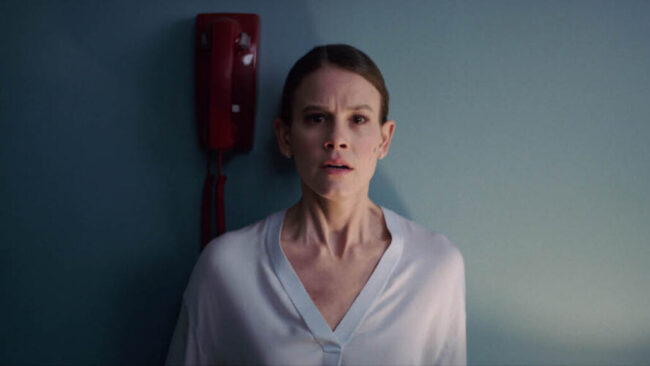
Often with these sorts of films, where the threat must build up its strength across a series of days (we’re told some victims have only lasted four), it can be tough to maintain any tension. For instance, the first two-thirds of most paranormal Activity movies. Luckily Parker can conjure up and escalate a feeling of dread. We fully believe something terrible can happen to Rose and, thanks to Bacon’s full-body performance, we feel every humiliation she does. For example, a scene involving an even more uncomfortable children’s birthday than The Babadook is devastating to see. Some of the iconography, particularly the titular expressions, can be gleefully unnerving. A lot of horror is about contrast – whether it’s the corruption of festivities, such as Christmas, or safe places such as the suburbs becoming scary. In Smile, the disparity is obvious. Yet as well as subverting a universal symbol of joy, Smile evokes the sadism behind many of our favourite slashers or spectres, reminding us of the cruel pleasure they take in tormenting their prey.
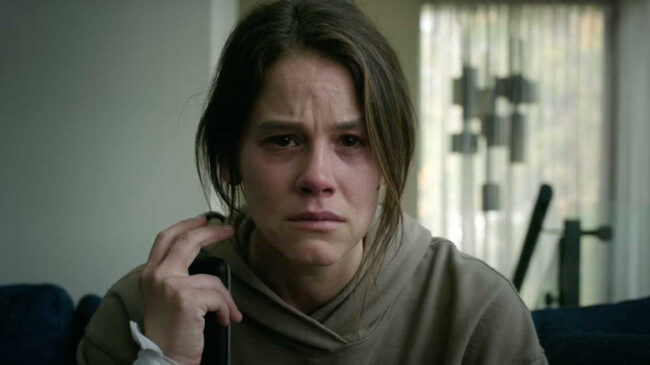
Unfortunately, there are some big problems with the connective tissue between set pieces. The main trouble is that much of the second half, in which Rose tries to find out the origins of her curse, adopts the framework of a mystery. Then, before telling us anything substantial, it retreats to the safety of the exact same dynamic in the exact location (down to the same room) most viewers will have worked out half an hour in. That doesn’t have to be a problem – plenty of films don’t go into the backing story of their baddy very much. But it is when the script makes a point of having its protagonist investigate. When we find ourselves no closer to a concrete answer There’s little pay-off, emotionally or in terms of interest, to what’s essentially an act-long detour. Some films build their structure around a question, but this one seems to ask questions to give it a structure. The difference is crucial.
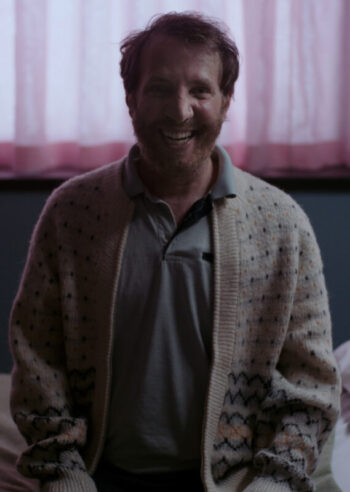
Sure, there’s the now obligatory attempt to blend the supernatural story with its mental health themes. From an early stage, the entity is characterised as the summation of everyone’s trauma (even if it conflates several types), making this ostensibly an empowerment narrative and commentary on the human condition. But for me, this aspect felt generic and fell flat. It also seems an afterthought when the focus becomes Rose’s childhood instead of the inciting event at the start – even if the two are linked. The resolution is also underwhelming, doing pretty much what you think it will but in a way that seems to undermine any message the movie puts forward. Still, I mostly judge horrors by how they make me feel in the cinema rather than after, and I was thrilled for large sections of Smile.
Rating: 




Smile is in cinemas September 28, 2022.



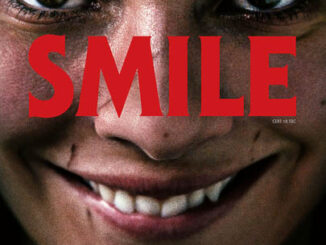
Be the first to comment